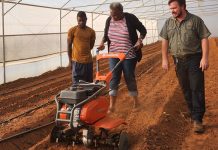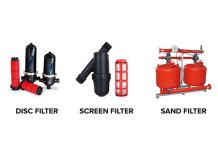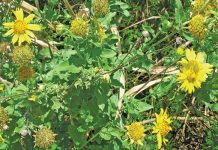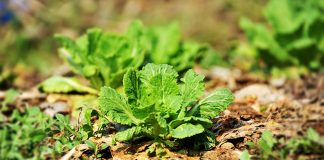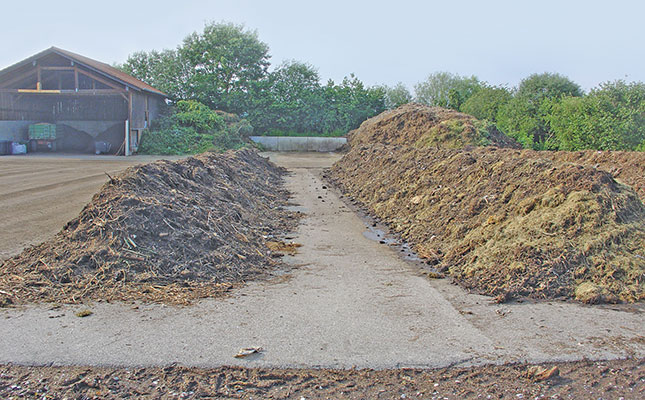
Photo: Wikimedia Commons
Thriving crops require healthy soil that nourishes the plants as they grow. One way to improve the quality of soil is to use compost. Compost contains various nutrients and minerals; it also introduces organisms, such as earthworms, and micro-organisms, such as bacteria, fungi and protozoa, into the soil. These help to decompose, and hence recycle, organic material.
Ultimately, compost is an excellent way of improving the health of soil, which, in turn, will lead to better crop yield.
Hot and cold composting
Composting requires ‘brown’ matter, such as leaves or branches, and ‘green’ matter, such as organic kitchen waste. The first is rich in carbon (C) and the second is rich in nitrogen (N).
The time it takes for compost material to decompose depends on the volume of the material and the size of the inputs (smaller and softer materials will break down faster than those that are larger and harder), as well as the amount of mixing and aeration.
The types of microbes working within the compost pile will also determine the speed at which the compost decomposes, with some microbes working faster at higher temperatures.
Bigger piles of compost generally reach higher temperatures, and remain in a thermophilic stage for days or weeks; this is ‘hot’ composting, and is generally used in large-scale agricultural activities.
‘Cold’ composting, a slower process that can take up to a year to complete, normally involves smaller piles of waste material. It is generally used in urban farming or gardening, when small amounts of organic waste are added to the pile over a long period. Because of these limitations, the compost pile can struggle to reach the required temperature for fast decomposition.
To ensure a speedy composting process, you need to ensure the right combination of air, water, carbon and nitrogen.
Typical compost pile problems
Jessica Dawe, the owner of Garden Centre, says the following are signs that your compost may be struggling:
- The pile is moist, but the material is matted and slow to break down: This indicates that the pile is struggling to ‘breathe’. Aerobic micro-organisms require oxygen, whereas anaerobic micro-organisms do not. For optimal composting, you should encourage aerobic life forms, as they speed up the composting process.
Solution: Introduce air into the pile by turning it regularly. - The compost smells foul: This is an indicator that the pile is too wet, and is dominated by anaerobic micro-organisms.
Solution: Turn the pile and add fast-decomposing sawdust or fine C material, such as chimney ash. Repeat as necessary. - Brown material is not breaking down: As mentioned, carbon (C) and nitrogen (N) are necessary for the decomposition of organic material, and the brown-to-green ratio describes the C:N ratio in the pile. Microbes thrive with a C:N ratio of about 30:1. (Browns are rich in carbon, and greens are rich in nitrogen.) The closer the compost pile is to this ratio, the more rapidly the material will decompose. A good general rule when simply judging the pile by its appearance is to have twice as many browns as greens.
Solution: If the brown material is not breaking down, add half as many greens to the pile. Mix in and soak thoroughly. - The compost catches fire: Too many greens can result in an excess of nitrogen, which can cause the compost to heat up so rapidly that it spontaneously combusts. This is a rare occurrence, however. Nevertheless, a hot compost pile can burn or kill crops, so it should be allowed to cool down before application.
Solution: Turn the pile frequently, and add water and browns to cool it down. - There are no worms or insects in the pile: Worms and mites are an indication of healthy compost. If the compost bin is new, or the pile is situated far from other piles, it may take some time for these organisms to appear.
Solution: Ensure that the C:N ratio is correct and there is adequate moisture. If you have started a pile/bin from scratch, add a few spadefuls of nearly composted material from an existing pile to introduce some organisms into the new pile. - Big pieces are not breaking down: Large pieces of organic material, such as branches, will take longer to process. In addition, these often don’t contain enough moisture, so they will upset the moisture balance in the pile.
Solution: Break large material into smaller pieces. - You are not keeping up: Compost needs to be turned frequently to introduce air into the pile. It must also be kept hydrated. Small interventions can make a major difference in this regard.
Solution: Keep a pitchfork handy for smaller piles, and turn the compost pile every time you add something.
If you have a smallholding or a farm and have larger piles of compost, assign an employee to turn the compost and maintain the water balance so that these important actions are carried out regularly and thoroughly.
Source: 7 Signs Your Compost is Struggling (and What You Can Do About It

